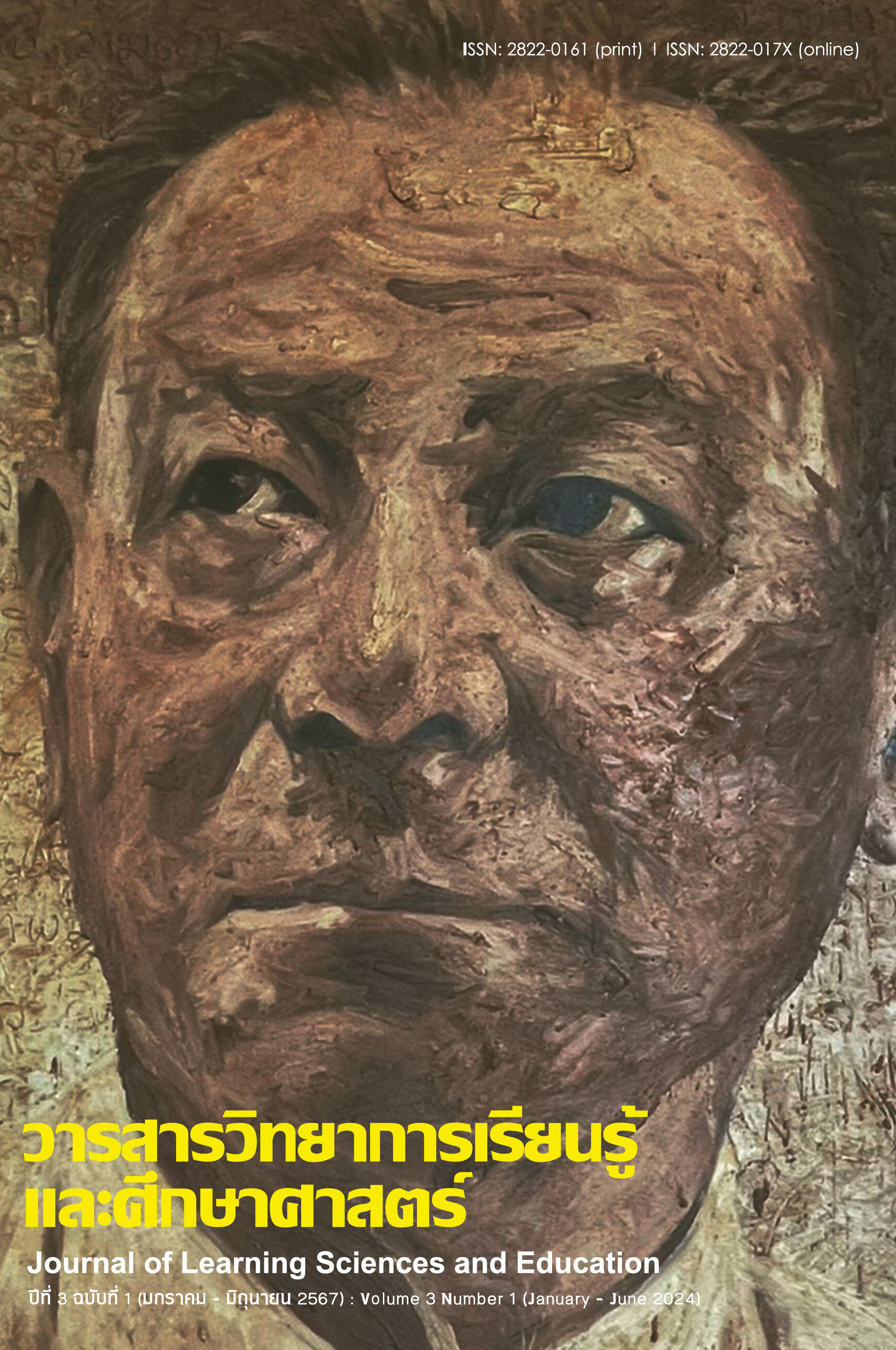Nano-Learning Guidelines to Promote Lifelong Learning Skills of Students in The Next Normal Society
Main Article Content
Abstract
The purposes of the research were: 1) to study the process of nano-learning management to promote the lifelong learning skills of students in the next normal society; and 2) to propose guidelines for nano-learning management to enhance the lifelong learning skills of students in the next normal society. The target groups are 1) high school teachers and 2) high school students. The research tools include a document analysis form and an in-depth interview form. The research found that: 1. The learning management process consists of a total of four steps: 1) Discover; 2) Expand; 3) Emerge; and 4) Review. 2. The learning management guidelines consist of four dimensions: 1) teacher readiness; 2) learning activity organization; 3) media and learning resources; and 4) assessment and evaluation.
Article Details

This work is licensed under a Creative Commons Attribution-NonCommercial-NoDerivatives 4.0 International License.
References
Al Shehhi, M. (2022). The use of Technology in Education: A Study About the Impact of Using Nano-Learning in Teaching English as A Foreign Language in Higher Education Institutions in the United Arab Emirates [Master’s thesis, The British University in Dubai]. https://bspace.buid.ac.ae/bitstream/handle/1234/2076/20190884.pdf?sequence=3&isAllowed=y
Bhanduaram, W., MangKhang, C., Yimsawat, C., & Wannapaisan, C. (2023). เครื่องมืออนาคตวิทยาการศึกษาเพื่อส่งเสริมทักษะการเรียนรู้ตลอดชีวิตของพลเมืองเน็กซ์ในยุควิถีถัดไป [Educational Futurology Tools to Promote Lifelong Learning Skills of Next Citizens in the Next Normal Era]. Journal of Education Studies. 51(1), 1-13.
Bronfenbrenner, U. (1977). Toward an experimental ecology of human development. American Psychology, 32, 513-531.
Chaiya, S. (2019). การพัฒนาทักษะการเรียนรู้ตลอดชีวิตของนักศึกษาในศตวรรษที่ 21 [The Developing Lifelong Learning Skills of Student in The 21th Century]. Srinakharinwirot Academic Journal of Education, 20(1), 168-180.
Department of Mental Health. (2561). คู่มือกิจกรรมพัฒนาความฉลาดทางอารมณ์ในวัยรุ่นอายุ 16-18 ปี [Activity manual for developing emotional intelligence in teenagers aged 16-18 years]. Bangkok: Beyond Publishing.
Digital Learning Institute. (n.d.). What is Nano Learning?. Retrieved March 6, 2024, from https://www.digitallearninginstitute.com/blog/what-is-nano-learning
Huachiew Chalermprakiet University. (2023). การเรียนรู้ตลอดชีวิต [Lifelong Learning]. Retrieved March 6, 2024, from https://www.hcu.ac.th/article/.
Jameel, S., & Albaiz, T. (2021). Review of the Use and Impact of Nano-Learning in Education. International Conference on Research in education, 4(1), 83-93.
Junsrithong, P. (2022). ชีวิตวิถีถัดไปกับการศึกษา [The Next Normal and Education]. Education Journal Faculty of Education, Nakhon Sawan Rajabhat University, 5(3), 25-36.
Khlaif, Z. N. & Salha, S. (2021). Using TikTok in Education: A Form of Micro-learning or Nano-learning?. Interdisciplinary Journal of Virtual Learning in Medical Sciences, 12(3), 213-218.
Kueaklang, S. (2018). องค์ประกอบและแนวทางการส่งเสริมการจัดการเรียนรู้ตลอดชีวิตของ กศน. ตำบล [factors and guidelines to facilitate lifelong learning in non-formal and informal education sub-district centers]. [Doctoral dissertation, Silpakorn University]. http://ithesis-ir.su.ac.th/dspace/bitstream/123456789/2386/1/56251803.pdf
MangKhang, C. & Kaewpanya, N. (2021). การบ่มเพาะมารยาทดิจิทัล: วิธีสอนออนไลน์เพื่อการเปลี่ยนแปลงสู่ความเป็นพลเมืองก้าวหน้าในห้องเรียนสังคมศึกษาเสมือนจริง [The Cultivating Digital Etiquette: Transformative Online Teaching Approach to Pro-Active Citizenship in the Social Studies Virtual Reality Classrooms]. Journal of Educational Innovation and Research, 6 (1), 204-213.
Mingsiritham, K. (2009). การเรียนรู้ด้วยการนำตนเองบนเครือข่าย [Self-directed Learning on Web-based Learning]. Journal of Education Khon Kean University, 32(1): 6-13.
Namdej, N. (2014). การเรียนรู้โดยผู้เรียนนำตนเอง [Self-Directed Learning]. Thai Dental Nurse Journal, 25(2), pages 27-38.
Office of the Education Council. (2022). สภาวะการศึกษาไทย ปี 2564 สถาวการณ์การจัดการศึกษาตามแผนการปฏิรูปประเทศด้านการศึกษา [Education situation in Thailand in 2021: Education management status under the national education reform plan]. Bangkok: Office of the Education Council.
Office of the Education Council. (2022). เทรนด์การศึกษาในปี 2023 [Education trends in 2023]. Retrieved October 28, 2022, from https://www.facebook.com/photo.php?fbid=447607367505853&id=100067697803075&set=a.439916994941557
Phromsiri, A. (2020). แผนการจัดการเรียนรู้รายวิชาการยศาสตร์กับการออกแบบภายในเพื่อให้สอดคล้องกับวิถีความปกติรูปแบบใหม่ยุคหลังโควิด-19 [the learning management for ergonomics for interior design in accordance with new normal of practices post covid-19]. Proceedings of SPU Educational transformation to the new normal. July 31, 2020. 310-320.
Ronsiri, S. (2018). การพัฒนาตัวบ่งชี้การเรียนรู้ตลอดชีวิตของพลเมืองไทยด้วยกระบวนการมีส่วนร่วมของชุมชน [development of lifelong learning indicators for Thai citizens using community participation process]. [Doctoral dissertation, Chulalongkorn University. https://digital.car.chula.ac.th/chulaetd/2852
Srisuwan, P. (2023). การพัฒนากิจกรรมการเรียนรู้แบบเน้นงานปฏิบัติร่วมกับการเรียนรู้แบบพอดีคําเพื่อ ส่งเสริมความสามารถด้านการพูดสื่อสารสำหรับนักเรียนชั้นประถมศึกษาปีที่ 3 [A development of learning activity by using task based learning combined with Nano-learning to enhance speaking ability for prathomsuksa 3 students]. [Master’s Independent Study, Naresuan University]. https://nuir.lib.nu.ac.th/dspace/handle/123456789/5849
Study International. (2021). Is Nano-learning the way forward?. Retrieved May 18, 2021, from https://studyinter national.com/news/nanolearning-pros-cons/
Suthasinobon, K. (2015). ห้องเรียนกลับด้าน [Flipped Classroom]. Encyclopedia of Education, faculty of Education, Srinakharinwirot University, 50(2015), 115-128.
Techtalkthai. (2023). 10 เทรนด์ EdTech แห่งปี 2023: เทคโนโลยีการศึกษาเพื่อการเรียนรู้ยุคใหม่ [10 EdTech trends of 2023: Educational technology for modern learning.]. Retrieved March 6, 2024, from https://www.techtalkthai.com/10-edtech-trends-2023/
Väätäjä, J. & Ruokamo, H. (2021). Conceptualizing dimensions and a model for digital pedagogy. Journal of Pacific Rim Psychology, 15(1), 1-12.
Vivekananth, P. (2022). Nano learning: A New Paradigm Shift in Teaching and Learning. International Journal of Engineering and Management Research, 12(1), 112-114.
Wisetdonwai, J. (2022). การศึกษายุคหลังโควิดจะใช้โลกทั้งใบเป็นห้องเรียน ด้วยการเรียนรู้แบบนำตนเอง [Education in the post-COVID era will use the entire world as a classroom. with self-directed learning]. Retrieved March 6, 2024, from https://www.educathai.com/knowledge/articles/535
Wongyai, W. & Patphol, M. (2021). การเรียนรู้แบบนำตนเองเชิงสร้างสรรค์ [Creative self-directed learning]. Bangkok: Innovative Leaders Center in Curriculum & Learning, Graduate School, Srinakharinwirot University


